朱自清 《匆匆》的翻译对比
- 格式:ppt
- 大小:490.00 KB
- 文档页数:15

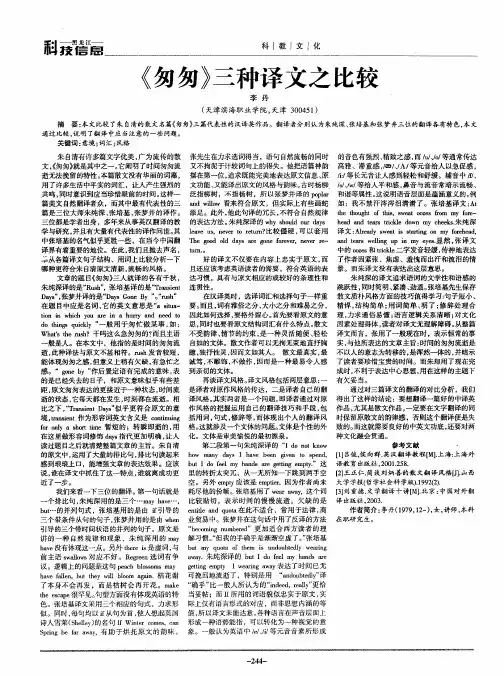
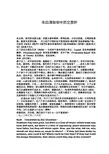
朱自清匆匆中英文赏析朱自清,现代著名散文家,其散文素朴缜密、清隽沉郁,以语言洗炼,文笔清丽著称,极富有真情实感。
并且他宁可饿死也不领美国的“救济粮”的故事家喻户晓。
代表作《匆匆》《歌声》《浆声灯影里的秦淮河》《温州的踪迹》《背影》《航船的文明》《荷塘月色》。
以下是朱自清先生的《匆匆》一文的两个版本的英文译文,《rush》是朱纯深教授翻译,《Transient Days》张培基老师翻译,各有千秋,《Transient Days》更加准确,而《rush》更有韵味,更加传神。
匆匆(朱自清)燕子去了,有再来的时候;杨柳枯了,有再青的时候;桃花谢了,有再开的时候。
但是,聪明的,你告诉我,我们的日子为什么一去不复返呢?——是有人偷了他们吧:那是谁?又藏在何处呢?是他们自己逃走了吧:现在又到了哪里呢?我不知道他们给了我多少日子;但我的手确乎是渐渐空虚了。
在默默里算着,八千多日子已经从我手中溜去;像针尖上一滴水滴在大海里,我的日子滴在时间的流里,没有声音,也没有影子。
我不禁汗涔涔而泪潸潸了。
去的尽管去了,来的尽管来着;去来的中间,又怎样地匆匆呢?早上我起来的时候,小屋里射进两三方斜斜的太阳。
太阳他有脚啊,轻轻悄悄地挪移了;我也茫茫然跟着旋转。
于是——洗手的时候,日子从水盆里过去;吃饭的时候,日子从饭碗里过去;默默时,便从凝然的双眼前过去。
我觉察他去的匆匆了,伸出手遮挽时,他又从遮挽着的手边过去,天黑时,我躺在床上,他便伶伶俐俐地从我身上跨过,从我脚边飞去了。
等我睁开眼和太阳再见,这算又溜走了一日。
我掩着面叹息。
但是新来的日子的影儿又开始在叹息里闪过了。
在逃去如飞的日子里,在千门万户的世界里的我能做些什么呢?只有徘徊罢了,只有匆匆罢了;在八千多日的匆匆里,除徘徊外,又剩些什么呢?过去的日子如轻烟,被微风吹散了,如薄雾,被初阳蒸融了;我留着些什么痕迹呢?我何曾留着像游丝样的痕迹呢?我赤裸裸来到这世界,转眼间也将赤裸裸的回去罢?但不能平的,为什么偏要白白走这一遭啊?你聪明的,告诉我,我们的日子为什么一去不复返呢?一九二二年三月二十八日Rush (translated by Zhu Chunshen)Swallows may have gone, but there is a time of return; willow trees may have died back, but there is a time of regreening; peach blossoms may have fallen, but they will bloom again. Now, you the wise, tell me, why should our days leave us, never to return? — If they had been stolen by someone, who could it be? Where could he hide then? If they had made the escape themselves, then where could they stay at the moment?I do not know how many days I have been given to spend, but I do feel my hands are getting empty. Taking stock silently, I find that more than eight thousand days has already slid away from me. Like a drop of water from the point of a needle disappearing into the ocean, my days are dripping into the stream of time, soundless, traceless. Already sweat is starting on my forehead, and tears welling up in my eyes.Those that have gone have gone for good, those to come keep coming; yet in between, how swift is the shift, in such a rush? When I get up in the morning, the slanting sun marks its presence in my small room in two or three oblongs. The sun has feet, look, he is treading on, lightly and furtively; and I am caught, blankly, in his revolution. Thus —the day flows away through the sink when I wash my hands, wears off in the bowl when I eat my meal, passes away before my day-dreaming gaze as I reflect in silence. I can feel his haste now, so I reach out my hands to hold him back, but he keeps flowing past my withholding hands. In the evening, as I lie in bed, he strides over my body, glides past my feet, in his agile way. The moment I open my eyes and meet the sun again, one whole day has gone. I bury my face in my hands and heave a sigh. But the new day begins to flash past in the sigh.What can I do, in this bustling world, with my days flying in their escape? Nothing but to hesitate, to rush. What have I been doing in that eight-thousand-day rush, apart from hesitating? Those bygone days have been dispersed as smoke by a light wind, or evaporated as mist by the morning sun. What traces have I left behind me? Have I ever left behind any gossamer traces at all? I have come to this world, stark-naked; am I to go back, in a blink, in the same stark-nakedness? It is not fair though: why should I have made such a trip for nothing!You the wise, tell me, why should our days leave us, never to return?28 March, 1922Transient Days (translated by Zhang Peiji)If swallows go away, they will come back again. If willows wither, they will turn green again. If peach blossoms fade, they will flower again. But, tell me, you the wise, why should our days go by never to return? Perhaps they have been stolen by someone. But who could it be and where could he hide them? Perhaps they have just run away by themselves. But where could they be at the present moment?I don't know how many days I am entitled to altogether, but my quota of them is undoubtedly wearing away. Counting up silently, I find that more than 8,000 days have already slipped away through my fingers. Like a drop of water falling off a needle point into the ocean, my days are quietly dripping into the stream of time without leaving a trace. At the thought of this, sweat oozes from my forehead and tears trickle down my cheeks.What is gone is gone, what is to come keeps coming. How swift is thetransition in between! When I get up in the morning, the slanting sun casts two or three squarish patches of light into my small room. The sun has feet too, edging away softly and stealthily. And, without knowing it, I am already caught in its revolution .Thus the day flows away through the sink when I wash my hands; vanishes in the rice bowl when I have my meal; passes away quietly before the fixed gaze of my eyes when I am lost in reverie. Aware of its fleeting presence, I reach out for it only to find it brushing past my out-stretched hands. In the evening, when I lie on my bed, it nimbly strides over my body and flits past my feet. By the time when I open my eyes to meet the sun again, another day is already gone. I heave a sign, my head buried in my hands. But, in the midst of my sighs, a new day is flashing past.Living in this world with its fleeting days and teeming millions, what can I do but waver and wander and live a transient life? What have I been doing during the 8,000 fleeting days except wavering and wandering? The bygone days, like wisps of smoke, have been dispersed by gentle winds, and, like thin mists, have been evaporated by the rising sun. What traces have I left behind? No, nothing, not even gossamer-like traces. I have come to this world stark naked, and in the twinkling of an eye, I am to go to back as stark naked as ever. However, I am taking it very much to heart: why should I be made to pass through this world for nothing at all?O you the wise, would you tell me please: why should our days go by never to return?朱纯深,香港城市大学中文、翻译及语言学系博士,非常有名的翻译家,翻译过朱自清的《荷塘月色》和《匆匆》。
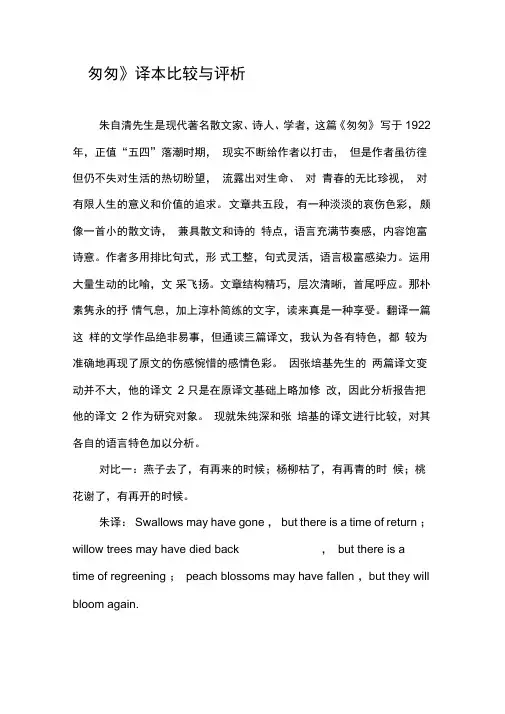
匆匆》译本比较与评析朱自清先生是现代著名散文家、诗人、学者,这篇《匆匆》写于1922 年,正值“五四”落潮时期,现实不断给作者以打击,但是作者虽彷徨但仍不失对生活的热切盼望,流露出对生命、对青春的无比珍视,对有限人生的意义和价值的追求。
文章共五段,有一种淡淡的哀伤色彩,颇像一首小的散文诗,兼具散文和诗的特点,语言充满节奏感,内容饱富诗意。
作者多用排比句式,形式工整,句式灵活,语言极富感染力。
运用大量生动的比喻,文采飞扬。
文章结构精巧,层次清晰,首尾呼应。
那朴素隽永的抒情气息,加上淳朴简练的文字,读来真是一种享受。
翻译一篇这样的文学作品绝非易事,但通读三篇译文,我认为各有特色,都较为准确地再现了原文的伤感惋惜的感情色彩。
因张培基先生的两篇译文变动并不大,他的译文2 只是在原译文基础上略加修改,因此分析报告把他的译文2 作为研究对象。
现就朱纯深和张培基的译文进行比较,对其各自的语言特色加以分析。
对比一:燕子去了,有再来的时候;杨柳枯了,有再青的时候;桃花谢了,有再开的时候。
朱译:Swallows may have gone ,but there is a time of return ;willow trees may have died back ,but there is a time of regreening ;peach blossoms may have fallen ,but they will bloom again.张译:If swallows go away,they will come back againif the willows wither ,they will turn green again ;ifpeaches blossoms fade ,they will flower again.分析:两人的译文都采用排比句,句子结构类似,也与原文形似。
但是,朱的译文最后一个分句没有使用thereisatime of 的句式,变为but they will bloom again ,气势上就没有三个完整排比句强烈,给人以没有很好地收尾的感觉。
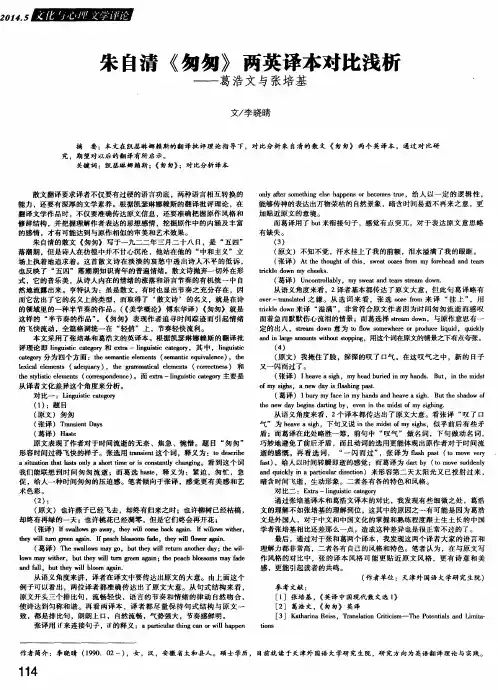
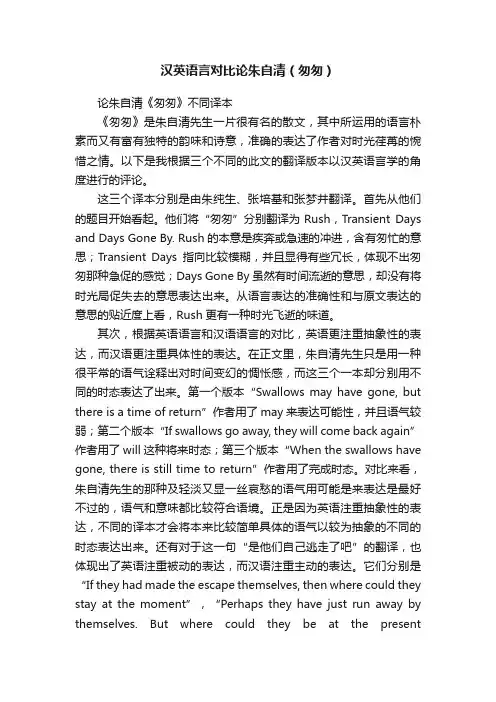
汉英语言对比论朱自清(匆匆)论朱自清《匆匆》不同译本《匆匆》是朱自清先生一片很有名的散文,其中所运用的语言朴素而又有富有独特的韵味和诗意,准确的表达了作者对时光荏苒的惋惜之情。
以下是我根据三个不同的此文的翻译版本以汉英语言学的角度进行的评论。
这三个译本分别是由朱纯生、张培基和张梦井翻译。
首先从他们的题目开始看起。
他们将“匆匆”分别翻译为Rush,Transient Days and Days Gone By. Rush的本意是疾奔或急速的冲进,含有匆忙的意思;Transient Days指向比较模糊,并且显得有些冗长,体现不出匆匆那种急促的感觉;Days Gone By虽然有时间流逝的意思,却没有将时光局促失去的意思表达出来。
从语言表达的准确性和与原文表达的意思的贴近度上看,Rush更有一种时光飞逝的味道。
其次,根据英语语言和汉语语言的对比,英语更注重抽象性的表达,而汉语更注重具体性的表达。
在正文里,朱自清先生只是用一种很平常的语气诠释出对时间变幻的惆怅感,而这三个一本却分别用不同的时态表达了出来。
第一个版本“Swallows may have gone, but there is a time of return”作者用了may来表达可能性,并且语气较弱;第二个版本“If swallows go away, they will come back again”作者用了will这种将来时态;第三个版本“When the swallows have gone, there is still time to return”作者用了完成时态。
对比来看,朱自清先生的那种及轻淡又显一丝哀愁的语气用可能是来表达是最好不过的,语气和意味都比较符合语境。
正是因为英语注重抽象性的表达,不同的译本才会将本来比较简单具体的语气以较为抽象的不同的时态表达出来。
还有对于这一句“是他们自己逃走了吧”的翻译,也体现出了英语注重被动的表达,而汉语注重主动的表达。
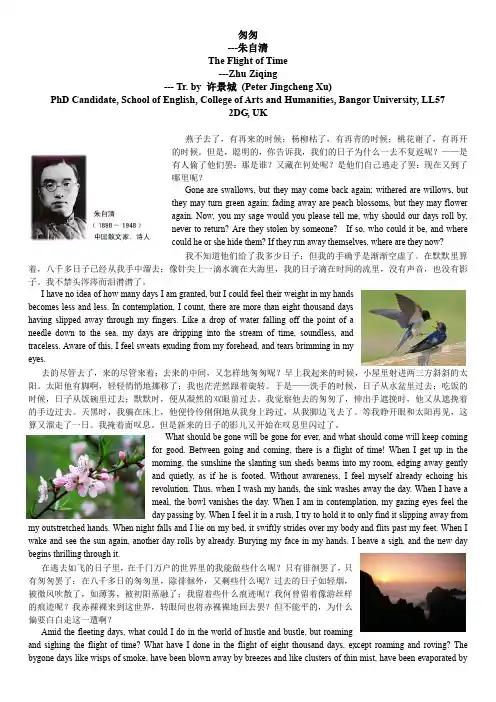
匆匆---朱自清The Flight of Time---Zhu Ziqing--- Tr. by 许景城(Peter Jingcheng Xu)PhD Candidate, School of English, College of Arts and Humanities, Bangor University, LL572DG, UK燕子去了,有再来的时候;杨柳枯了,有再青的时候;桃花谢了,有再开的时候。
但是,聪明的,你告诉我,我们的日子为什么一去不复返呢?——是有人偷了他们罢:那是谁?又藏在何处呢?是他们自己逃走了罢:现在又到了哪里呢?Gone are swallows, but they may come back again; withered are willows, butthey may turn green again; fading away are peach blossoms, but they may floweragain. Now, you my sage would you please tell me, why should our days roll by,never to return? Are they stolen by someone? If so, who could it be, and wherecould he or she hide them? If they run away themselves, where are they now?我不知道他们给了我多少日子;但我的手确乎是渐渐空虚了。
在默默里算着,八千多日子已经从我手中溜去;像针尖上一滴水滴在大海里,我的日子滴在时间的流里,没有声音,也没有影子。
我不禁头涔涔而泪潸潸了。
I have no idea of how many days I am granted, but I could feel their weight in my handsbecomes less and less. In contemplation, I count, there are more than eight thousand dayshaving slipped away through my fingers. Like a drop of water falling off the point of aneedle down to the sea, my days are dripping into the stream of time, soundless, andtraceless. Aware of this, I feel sweats exuding from my forehead, and tears brimming in myeyes.去的尽管去了,来的尽管来着;去来的中间,又怎样地匆匆呢?早上我起来的时候,小屋里射进两三方斜斜的太阳。
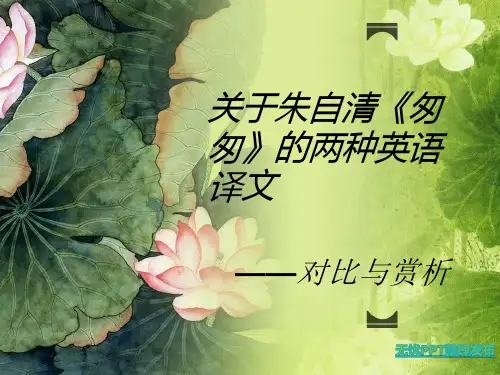
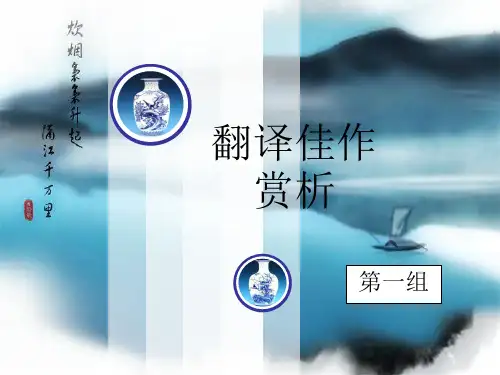
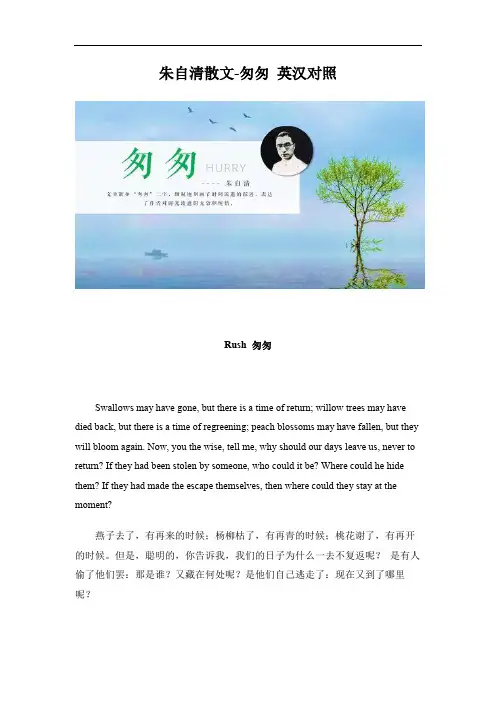
朱自清散文-匆匆英汉对照Rush 匆匆Swallows may have gone, but there is a time of return; willow trees may have died back, but there is a time of regreening; peach blossoms may have fallen, but they will bloom again. Now, you the wise, tell me, why should our days leave us, never to return? If they had been stolen by someone, who could it be? Where could he hide them? If they had made the escape themselves, then where could they stay at the moment?燕子去了,有再来的时候;杨柳枯了,有再青的时候;桃花谢了,有再开的时候。
但是,聪明的,你告诉我,我们的日子为什么一去不复返呢?是有人偷了他们罢:那是谁?又藏在何处呢?是他们自己逃走了:现在又到了哪里呢?I don''t know how many days I have been given to spend, but I do feel my hands are getting empty. Taking stock silently, I find that more than eight thousand days have already slid away from me. Like a drop of water from the point of a needle disappearing into the ocean, my days are dripping into the stream of time, soundless, traceless. Already sweat is starting on my forehead, and tears welling up in my eyes.我不知道他们给了我多少日子;但我的手确乎是渐渐空虚了。
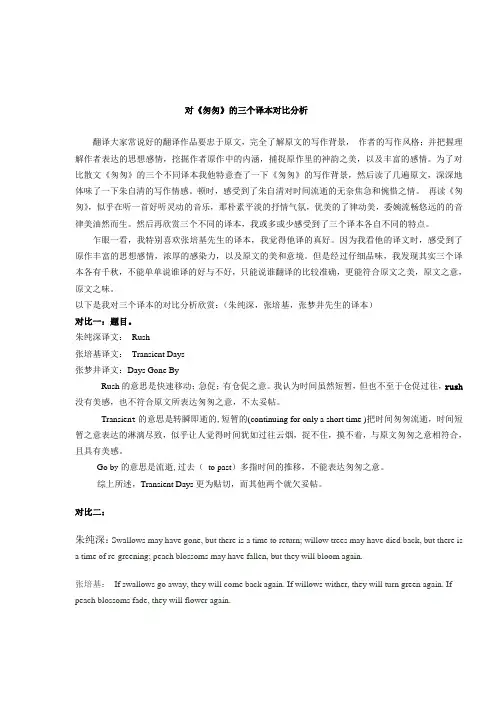
对《匆匆》的三个译本对比分析翻译大家常说好的翻译作品要忠于原文,完全了解原文的写作背景,作者的写作风格;并把握理解作者表达的思想感情,挖掘作者原作中的内涵,捕捉原作里的神韵之美,以及丰富的感情。
为了对比散文《匆匆》的三个不同译本我他特意查了一下《匆匆》的写作背景,然后读了几遍原文,深深地体味了一下朱自清的写作情感。
顿时,感受到了朱自清对时间流逝的无奈焦急和惋惜之情。
再读《匆匆》,似乎在听一首好听灵动的音乐,那朴素平淡的抒情气氛,优美的了律动美,委婉流畅悠远的的音律美油然而生。
然后再欣赏三个不同的译本,我或多或少感受到了三个译本各自不同的特点。
乍眼一看,我特别喜欢张培基先生的译本,我觉得他译的真好。
因为我看他的译文时,感受到了原作丰富的思想感情,浓厚的感染力,以及原文的美和意境。
但是经过仔细品味,我发现其实三个译本各有千秋,不能单单说谁译的好与不好,只能说谁翻译的比较准确,更能符合原文之美,原文之意,原文之味。
以下是我对三个译本的对比分析欣赏:(朱纯深,张培基,张梦井先生的译本)对比一:题目。
朱纯深译文:Rush张培基译文:Transient Days张梦井译文:Days Gone ByRush的意思是快速移动;急促;有仓促之意。
我认为时间虽然短暂,但也不至于仓促过往,rush 没有美感,也不符合原文所表达匆匆之意,不太妥帖。
Transien t的意思是转瞬即逝的,短暂的(continuing for only a short time )把时间匆匆流逝,时间短暂之意表达的淋漓尽致,似乎让人觉得时间犹如过往云烟,捉不住,摸不着,与原文匆匆之意相符合,且具有美感。
Go b y的意思是流逝,过去(to past)多指时间的推移,不能表达匆匆之意。
综上所述,Transient Days更为贴切,而其他两个就欠妥帖。
对比二:朱纯深:Swallows may have gone, but there is a time to return; willow trees may have died back, but there is a time of re-greening; peach blossoms may have fallen, but they will bloom again.张培基:If swallows go away, they will come back again. If willows wither, they will turn green again. If peach blossoms fade, they will flower again.张梦井:When the swallows have gone, there is still time to return; when the poplar and willow trees have become withered, there is still time to see green; when the peach flowers have already faded, there is still time to blossom.三人都运用排比句,句子结构类似,与原文形似,且读起来朗朗上口,自然流畅,气势强大,节奏感鲜明。
功能翻译理论视域下朱自清散文《匆匆》的译文比较赏析朱自清的散文《匆匆》以心灵和生活的深刻形象,生动地描写了生活的无常和世事的不可知性,抒发出人对晚年生活的期待和恐惧,也流露出对美好生活的渴望。
本文将以《功能翻译理论视域下朱自清散文《匆匆》的译文比较赏析》为标题,比较分析不同译者对朱自清《匆匆》的译文,以期从功能翻译理论视角,赏析其中所饱含的翻译文体特点。
诞生于抗战年代的《匆匆》是当代著名作家朱自清的优秀作品之一,其语言简洁而深刻,表达出人们对生活无常和世事不可知性的深刻洞察,抒发出人对晚年生活的期待和恐惧,也流露出对美好生活的渴望。
朱自清的《匆匆》虽是散文,但其语句简洁有力,既包含文言文表达,又有现代文感染,使之自然而无卡顿,蕴含出一种悠久又充满活力的韵律感与美感,因而具有极强的译文不可分割性质。
朱自清《匆匆》译文的比较赏析应从当代功能翻译理论出发,依据翻译文体特点,将汉英双语译文分为准谱译文、参照译文、模仿译文三类,来观察其翻译风格和技巧,以求实现最佳翻译效果,从而深入剖析译文的表达意义。
首先,讨论准谱译文,准谱译文注重以有条理的“原文译文”结构,将“原文-翻译”间的衔接及相应词语、词义等细节进行翻译分析,以使译文与原文表达含义与形式相符,获得准确意义。
此类译文中,于谦认获得了不错的结果,其译文中在衔接上把握的基本上准确无误,初阶的表达也新颖活泼,并且有较强的原文特点:例如译文中的“轻轻弯腰,把缠绕的小灯笼背起来”,与原文的“把腰弯起来,背起缠着的灯笼”近乎完全相符,可谓与原文有着精致的把握。
其次,参照译文。
参照译文注重翻译技巧,基于受译语文化背景的变化,对源文有一定的借鉴和选择,以及充分运用表达形式,以达到更为灵活和准确的表达效果。
如徐家骏译文,从“锦夜一锣起”到“日落西山夕阳斜”等,其中就有许多自然的表达,以及潜移默化的语言,有效把握了原文的情调,同时又能更加地清晰地表达出诗句的意境,可谓是参照译文中的佳作。
匆匆Rush燕子去了,有再来的时候;杨柳枯了,有再青的时候;桃花谢了,有再开的时候。
但是,聪明的,你告诉我,我们的日子为什么一去不复返呢——是有人偷了他们罢:那是谁?又藏在何处呢?是他们自己逃走了罢——现在又到了那里呢?Swallows may have gone, but there is a time of return; willow trees may have died back, but there is a time of regreening; peach blossoms may have fallen, but they will bloom again. Now, you the wise, tell me, why should our days leave us, never to return? — If they had been stolen by someone, who could it be? Where could he hide then? If they had made the escape themselves, then where could they stay at the moment?【解析】文章一开头,用了一个三重排比句,具有很强的气势。
英译时采用了相应的句式,但为了避免过多重复而显得单调,在最后一部分稍作改变,不用there is a time of reblooming 。
我不知道他们给了我多少日子,但我的手确乎是渐渐空虚了。
在默默里算着,八千多日子已经从我手中溜去,像针尖上一滴水滴在大海里,我的日子滴在时间的流里,没有声音,也没有影子。
我不禁头涔涔而泪潸潸了。
I do not know how many days I have been given to spend, but I do feel my hands are getting empty. Taking stock silently, I find that more than eight thousand days has already slid away from me. Like a drop of water from the point of a needle disappearing into the ocean, my days are dripping into the stream of time, soundless, traceless. Already sweat is starting on my forehead, and tears welling up in my eyes.【解析】在本世纪的白话文中,我们常常会发现第三人称代词的用法不甚规范。
匆匆---朱自清The Flight of Time---Zhu Ziqing--- Tr. by 许景城(Peter Jingcheng Xu)PhD Candidate, School of English, College of Arts and Humanities, Bangor University, LL572DG, UK燕子去了,有再来的时候;杨柳枯了,有再青的时候;桃花谢了,有再开的时候。
但是,聪明的,你告诉我,我们的日子为什么一去不复返呢?——是有人偷了他们罢:那是谁?又藏在何处呢?是他们自己逃走了罢:现在又到了哪里呢?Gone are swallows, but they may come back again; withered are willows, butthey may turn green again; fading away are peach blossoms, but they may floweragain. Now, you my sage would you please tell me, why should our days roll by,never to return? Are they stolen by someone? If so, who could it be, and wherecould he or she hide them? If they run away themselves, where are they now?我不知道他们给了我多少日子;但我的手确乎是渐渐空虚了。
在默默里算着,八千多日子已经从我手中溜去;像针尖上一滴水滴在大海里,我的日子滴在时间的流里,没有声音,也没有影子。
我不禁头涔涔而泪潸潸了。
I have no idea of how many days I am granted, but I could feel their weight in my handsbecomes less and less. In contemplation, I count, there are more than eight thousand dayshaving slipped away through my fingers. Like a drop of water falling off the point of aneedle down to the sea, my days are dripping into the stream of time, soundless, andtraceless. Aware of this, I feel sweats exuding from my forehead, and tears brimming in myeyes.去的尽管去了,来的尽管来着;去来的中间,又怎样地匆匆呢?早上我起来的时候,小屋里射进两三方斜斜的太阳。